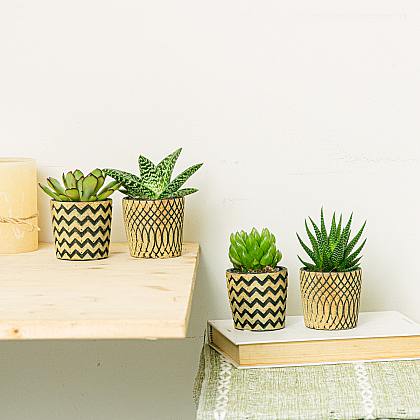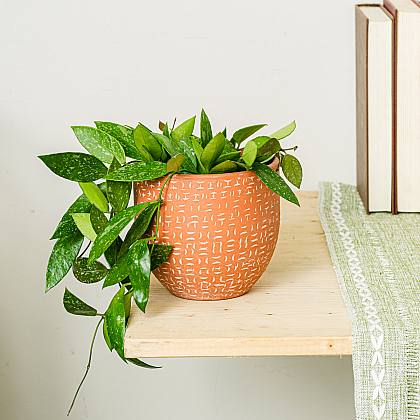Plants that stand up to air conditioning and keep you cool in summer
If you're looking for a natural and effective way to keep your home cool during the summer, plants may be your ideal solution
If you're looking for a natural and effective way to keep your home cool during the summer, plants may be your ideal solution. In this article, we'll explore the best plants to beat the summer heat and also withstand air conditioning. Plus, you'll discover the additional benefits of having plants in your home, as well as tips on how to care for them during the hottest season. We'll also come up with creative ideas for incorporating plants into your interior décor. Don't miss out on this complete guide to freshen up your home naturally!
Why should you have plants in your home?
Having plants in your home is not only a way to decorate your space, but it can also be beneficial for your health and well-being. Plants are known to purify the air by removing toxins and increasing oxygen levels, which can improve indoor air quality and reduce the risk of respiratory illnesses. Additionally, plants can help reduce stress and anxiety by creating a more relaxing and peaceful environment. Some studies have shown that being around plants can lower blood pressure and improve mood. Another advantage of having plants in your home is that they can act as natural humidifiers, which can be especially helpful during the drier months of the year. They can also help absorb noise and improve acoustics indoors. In addition, caring for plants can be a therapeutic and rewarding activity that encourages responsibility and patience. Overall, having plants in your home can improve quality of life in a simple and natural way.
The Best Plants to Beat the Summer Heat
The high temperatures of summer can be unbearable, but having plants at home can help keep the environment cool and pleasant. Some of the best plants to beat the heat are mint, rosemary, and lavender. Mint has a refreshing scent that helps reduce the feeling of heat in a room, as well as being an easy plant to care for. Rosemary also has a fresh and pleasant aroma, and is known for its antioxidant and anti-inflammatory properties. Plus, it's hardy to the sun and doesn't require a lot of watering, making it a great choice for summer. Finally, lavender is a popular plant for its relaxing and calming scent, which can help reduce stress and improve sleep. In addition, it is also sun hardy and can grow well indoors or outdoors.
Other plants that can help beat the summer heat are cacti and succulents, as they have the ability to store water in their leaves and stems. Palm trees are also a good choice, as their large leaves can provide shade and reduce ambient temperature. In general, it's important to choose plants that are well suited to your home's climate and environment to ensure they survive through the summer.
Plants That Survive Air Conditioning
There are certain plants that can survive in air-conditioned environments, making them an ideal choice for decorating and cooling your home during the summer. These plants are able to withstand the low temperatures and dryness of the air generated by air conditioning systems. Some of the plants best suited for this type of environment include Boston fern, dracena marginata, snake plant, and ficus benjamina. These plants are known for their ability to purify the air and add moisture to the environment, which is especially beneficial when exposed to cold, dry air from the air conditioner. In addition, these plants are also resistant to a lack of natural light, making them a great choice to place near windows or in dimly lit rooms. When choosing plants that survive air conditioning, be sure to provide them with regular but moderate watering, avoiding overwatering that could damage their roots. It is also advisable to place them in well-draining pots and fertilize them occasionally to keep them healthy. With these plants in your home, you will be able to enjoy a cool and pleasant environment throughout the summer, without compromising their beauty and vitality.
Additional Benefits of Houseplants
In addition to their ability to freshen the air and improve air quality, houseplants also offer other additional benefits. For example, studies have shown that having plants in the home can reduce stress levels and improve people's mood. This is because plants have a relaxing effect and can help create a calmer and more harmonious environment in the home. Additionally, some plants have purifying properties and can help remove toxins from the air, improving respiratory health and reducing the risk of air pollution-related illnesses. Other plants, such as lavender or jasmine, have aromatic properties and can help improve sleep quality and reduce insomnia problems. Overall, having plants in the home is a natural and effective way to improve the quality of life and create a healthier and more harmonious environment at home. It is important to choose suitable plants for each space, considering factors such as the amount of natural light, humidity and temperature, as well as learning how to care for them correctly to ensure their healthy growth.
How to Care for Your Plants During the Summer
During the summer, plant care is crucial to keeping them healthy and beautiful. First of all, it's important to water them frequently, especially on hot days. It's best to do it early in the morning or late at night, when the sun isn't as strong and the temperature is cooler. It is also essential to ensure that the pots have good drainage to prevent water accumulation and prevent fungal diseases. In addition, it is advisable to provide shade for plants that do not tolerate direct sunlight well throughout the day.
Another important aspect is to fertilize the plants regularly. During the summer, plants grow faster and need extra nutrients to stay healthy. It is advisable to use organic or natural fertilizers to avoid damaging the roots and polluting the environment.
Finally, it is essential to pay attention to the pests and diseases that can affect our plants during the summer. High temperatures and humidity can favor the appearance of insects and fungi, so it is important to be aware of any signs of damage or deterioration in our plants.
In short, caring for our plants during the summer requires constant commitment and attention to detail. Watering them frequently, providing shade, fertilizing them properly, and preventing pests are some of the keys to keeping them healthy and beautiful during this season.
Creative Ideas for Incorporating Plants into Your Interior Decor
Creative Ideas for Incorporating Plants into Your Interior Decor
Incorporating plants into interior décor can be a creative and refreshing way to spice up your spaces. One idea is to use hanging planters, which not only save space, but also add a touch of elegance to any room. You can hang them in the corners of your living room or in the kitchen window, thus creating a cozy and natural atmosphere.
Another option is to use shelves or shelves to display your favorite plants. You can place different sizes and varieties of plants on different levels, thus creating an interesting visual effect. In addition, this allows you to make the most of the vertical space of your walls.
If you're more daring, you can choose to create a vertical garden on an empty wall. You can use floating shelves or even install special panels for vertical gardens. Not only will this add color and freshness to your home, but it will also act as a unique focal point.
For those who are short on space, terrariums are a great option. Not only are these small enclosed ecosystems easy to care for, but they also add a touch of charm and sophistication to any room.
In short, there are many creative ways to incorporate plants into your interior décor. Whether using hanging planters, bookshelves, vertical gardens, or terrariums, these ideas will help you create fresh, lively spaces within your home.
Conclusion: A Natural and Effective Way to Keep Your Home Cool
Conclusion: A Natural and Effective Way to Keep Your Home Cool
In conclusion, plants are a natural and effective solution to keep your home cool during the summer. Not only are they a beautiful addition to interior décor, but they also have cooling properties that can help beat the heat. By having plants in your home, you can take advantage of their ability to release moisture through transpiration, which helps cool the environment naturally. In addition, many plants also have the ability to filter the air and remove toxins, thus improving indoor air quality.
By choosing the right plants, you can ensure that they survive the summer heat and air conditioning. Plants such as Boston fern, bamboo palm, and pothos are great choices due to their hardiness and ability to adapt to different conditions. It is important to take care of your plants during the summer, providing them with the right amount of water and avoiding direct exposure to the sun in the hottest hours of the day.
In addition to keeping your home cool, plants also offer additional benefits. Studies have shown that having plants indoors can reduce stress, improve concentration, and increase productivity. They can also help purify the air and create a healthier environment.
In short, incorporating plants into your home not only gives you a touch of nature and aesthetic beauty, but also helps you maintain a fresh and healthy environment. So don't hesitate to take advantage of the benefits of plants during the summer and enjoy a cooler and cozier home in a natural way.
Plants are a great option to keep our home cool and pleasant during the summer, and at the same time improve the quality of the air we breathe. In addition, they provide us with multiple additional benefits, such as reducing stress and increasing creativity. In this article, we've looked at the best plants to beat the summer heat and survive air conditioning, as well as some helpful tips for taking proper care of them. We've also explored some creative ideas to incorporate into our interior décor. However, it's important to remember that each plant has its own specific needs and requirements, so it's critical to do your research before you buy them and make sure you're providing them with the right conditions for their growth and survival. Do you dare to give a natural touch to your home with houseplants?


